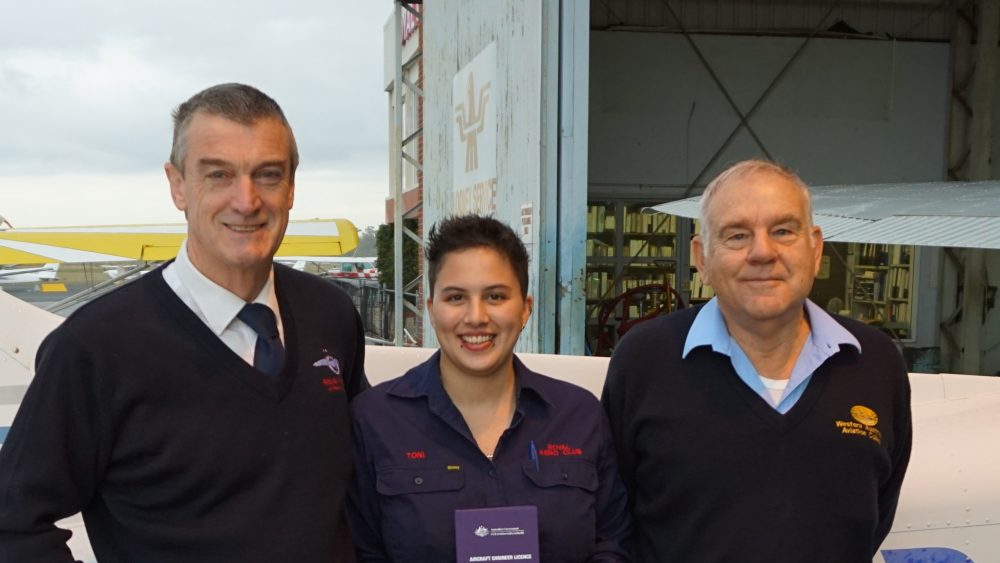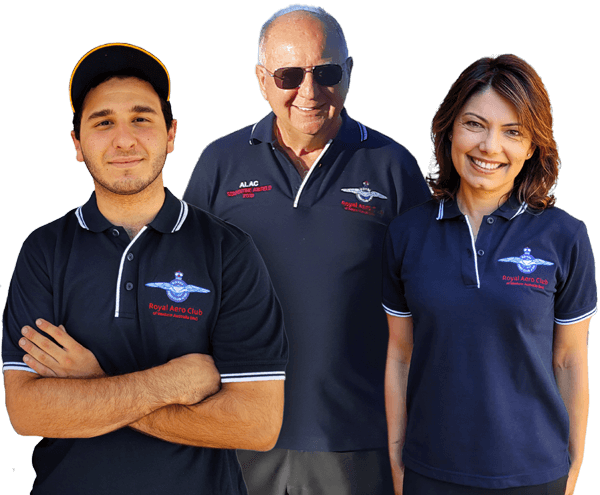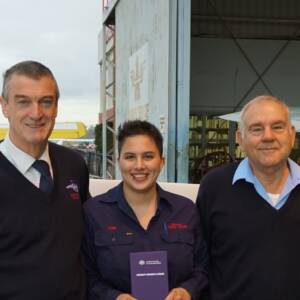Congratulations to Toni on becoming a licensed aircraft maintenance engineer (LAME). It is not an easy road to travel, and has made more difficult by regulatory changes by CASA and the training authorities. At a time when the shortage of LAMEs is even greater than the shortage of pilots, it seems incredible that the industry is not encouraging our youth to enter this discipline. Indeed, many maintenance organisations at Jandakot, and throughout Australia, have ceased taking on apprentices and trainees. The reasons given for stopping this essential training is the lack of clarity of the regulations surrounding the LAME licence, the cost of training an apprentice/trainee and the resources required for the training.
Glen Caple and his team have bucked this trend, with the Club investing heavily in engineering training. We currently have three staff training to become LAMEs. This requires a significant financial and manpower investment by RACWA, but without sufficient LAMEs in the industry, aircraft will simply be grounded for longer and longer periods.
I would like to thank Glen and his team, including Graeme Blakers who has moved to a chief engineer position elsewhere at Jandakot, for helping Toni achieve this milestone. Congratulations Toni for your hard work and dedication, which are essential traits required to become a LAME. I look forward to your broad grin as you inform me that you have added an engine licence to your qualifications…. David Currey, RACWA CEO.
What got you interested in aviation and aircraft originally?
I’ve always had an interest and passion for anything with an engine, the bigger the engine the better. When I first started the Aviation Pre-Apprenticeship course at TAFE, I was instantly interested in learning more. My work experience at the Royal Aero Club of WA is how I knew this career path was the one for me. I didn’t want a job; I wanted a career. Something that would always challenge me. With the aviation industry things are always progressing, changing, so I’ll always be learning and that’s what I wanted.
What was involved attaining your LAME?
A lot of hard work, long study periods and dedication. When my mates were partying and gaming I was studying, sitting licensing exams and writing my CASA schedule of experience logbooks. I could have easily slacked off and joined my mates but I knew if I wanted to obtain my future plans I needed to make some small sacrifices now. I also received help and support from my co-workers, my mum and my girlfriend through it all. It would have been difficult without them, I cannot thank them enough.
What advice would you give to other people wanting to follow a similar career path?
DON’T GIVE UP!! It takes a lot of hard work, yes, but IT’S WORTH IT!! Focus on one licence at a time and keep chipping away at it till you achieve it. I personally pre-book my CASA exams a month in advance – this gave me a goal to work towards each month. Don’t be discouraged if you fail an exam either. Study those areas a bit more or ask a LAME to explain anything you’re stuck on and go for it again. If you’re looking to obtain an apprenticeship in the industry – get out there and talk with the chief engineers – drop in regularly with updated resumes so they can put a face to the name, ask for work experience, and show
you’re serious about the job. Trust me finally becoming a LAME is an amazing feeling.
Are there many women in your industry?
No, but I’d like to see more enter the industry. It’s still a male-dominated industry where very few companies take on apprentices, and when they do, employers tend to look to male apprentices over females. There are also a lot fewer females applying for apprenticeships in the industry, but, I’m confident that this will continue to change. This isn’t a male job, I’m proof that females can succeed in this industry.
What are your plans now that you’re a LAME?
I’m currently working towards my next license for the category engines, so even more hard work and studying ahead of me. I still have a lot to learn in the meantime, as a new LAME I’ll be taking on more responsibility, by playing a vital role in teaching/
supporting apprentices as they progress.
What do you like most about your job?
On an aircraft I’d have to say engines. I’m a gear head at heart, I love doing an engine overhaul/ Top overhaul, stripping it down, inspecting all the parts and rebuilding it. But overall I’d say it’s the challenge. I’m constantly learning and being challenged by new problems or experiences every day, there is always something new to learn or improve, and I always will be.



